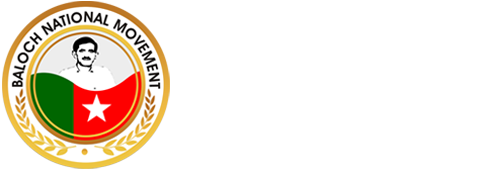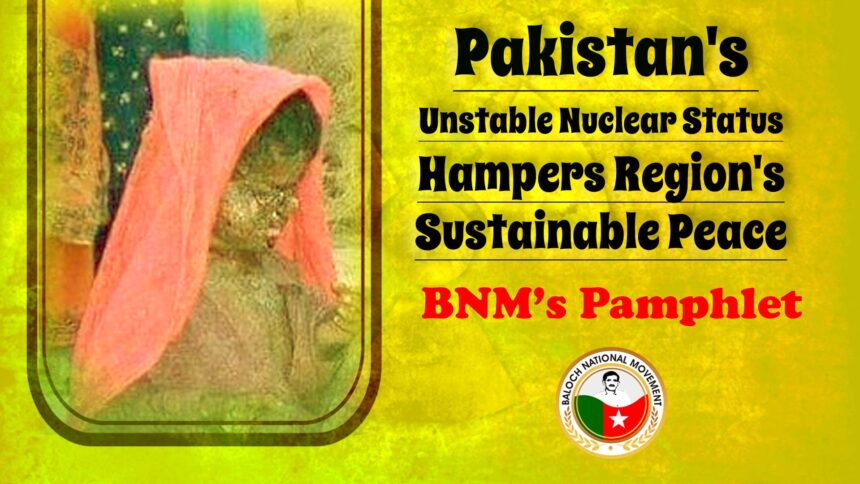BNM’s Pamphlet: Pakistan’s Unstable Nuclear Status Hampers Region’s Sustainable Peace
‘Sustainable peace in the region is impossible without independent Balochistan; Supporting our movement is the support of peace and humanity.’
On the morning of May 28, 1998, the people of Balochistan woke up with unusual restlessness and mysterious eye disease. From the coast of Balochistan to the Kho-e-Sulaiman region, the public was unaware of the radiation wave emitted by Pakistan’s nuclear tests at Raskoh. Without media, a lack of education, awareness, and communication prevented the public from realizing the effects this radiation would have on their environment. Even now, cancer and skin diseases are prevalent in Balochistan, particularly in those areas affected by nuclear experiments. The mountain range surrounding Raskoh was said to be uninhabited, but its effects transformed the area into a depopulated wasteland, with rivers and water sources polluted from the nuclear explosion. The mountain range itself turned white as a result of the tests.
At the time, PML-N was in power in Pakistan. Prime Minister Nawaz Sharif, elected with a heavy mandate, was considered a powerful ruler. A puppet government of Attaullah Mengal’s BNP was established in Balochistan, and Attaullah Mengal’s son, Akhtar Mengal, was appointed Chief Minister. He even drove Nawaz Sharif’s car to visit the nuclear explosion site. The national movement in Balochistan had little influence, and the effects of radiation were suppressed through political propaganda disseminated by the Pakistan army’s strong allies in Islamabad and Shaal.
However, the world changed after May 28, 1998. The Pakistani army humiliated the leading figures who made Pakistan a nuclear power, from Zulfiqar Ali Bhutto to Nawaz Sharif and Abdul Qadeer. Akhtar Mengal, the Chief Minister of Balochistan at the time, was removed from power and treated very poorly. To this day, Akhtar Mengal has not received acknowledgement for his role, nor has Pakistan’s political leadership recognized the effects of the nuclear tests. The political effects of the experiment were also significant at the regional and global levels. The Pakistani army, government, and key nuclear scientist Abdul Qadeer Khan played a role in the proliferation of nuclear weapons around the world. For decades, Pakistan has developed nuclear weapons, and all Islamic countries were assured that Pakistan’s atomic bomb was for the security of the entire Islamic world.
There is now a country with an ‘atomic bomb’ that possesses deeply rooted religious forces in society and widespread religious extremism in the military. Not only are radical Islamic parties like Jamiat Ulema-e-Islam and Jamaat-e-Islami powerful, but also organizations such as Tehreek-e-Taliban Pakistan and the Islamic State (ISIS). Jihadist groups like Tehreek-e-Jihad Pakistan are also active and are waging an armed war with the state to seize power.
Democracy has never been strong in Pakistan. The army controls all state institutions through a group of corrupt elements. The army influences political parties from Tablighi Jamaat, and the previous PTI government was accused of playing the role of the army’s “B-Team”. The current PDM (Pakistan Democratic Front) government, which came to power after a movement against the PTI government, has been critical of the Pakistan Army in the past. Maulana Fazlur Rahman and Nawaz Sharif used to criticize the army for interfering in political affairs. However, as soon as this group was brought into power with the army’s support, they broke records in supporting the army. It is clear that the Pakistani army is on both sides of the chessboard, playing with all the pieces in their grasp.
This month, protests in Pakistan following the arrest of PTI Chief Imran Khan have reignited questions about the presence of atomic bombs in such a volatile country. Pakistan is incapable of having this weapon of mass destruction under its control. The army considered the most unprofessional and corrupt army in the world, keeps the constitution and laws of Pakistan under its boot. The military’s immediate intervention in all political matters, large and small, has seriously affected many sections of society. The army’s occupation of educational institutions has destroyed public consciousness, deliberately keeping Pakistani society intellectually backward to maintain its corrupt dominance over the state.
The PTI, which was designed as a full supporter party by the Pakistan Army, has caused significant divisions within the Pakistan Army, where various ideological political clubs are active. Due to Khan’s support, the situation has been pushed towards a civil war in Punjab, which holds supreme power in Pakistan. Similarly, the government and the military establishment have violated human rights and laws, which should be a cause of global concern.
In a state where laws and human rights are not respected, popular uprisings can bring instability at any time, whether this public anger manifests itself in support of Imran Khan or violent protests by religious groups like Tehreek-e-Labaik Pakistan (TLP). Such movements are motivated by the state’s negative treatment of the people. If all opportunities for public expression are blocked, or people are prevented from protesting by force, religious militant organizations may attract people as an alternative hope. The only way to eliminate this situation lies in the proposed measures presented below; otherwise, the region’s situation will bring the whole world to the brink of destruction.
Over the last 25 years, since these nuclear tests in Balochistan, Pakistan has increased state atrocities and crimes in the region. Thousands of people have been forcibly disappeared, killed, and forced to go into exile. A large number of Baloch refugees living in Iran and Afghanistan are living a poor and insecure life, where they face threats to their lives in addition to lacking basic facilities like health, education, and employment.
The Baloch National Movement (BNM) aims to draw the attention of international organizations to recognize Pakistan as an unstable nuclear power and an occupier of other national units, including Balochistan. They urge international entities to assist the Baloch nation in all possible ways to overcome this situation. Instead of being blackmailed by Pakistan’s nuclear weapons, world powers should take seriously the threats that Pakistan uses to blackmail the world. Recent events in Pakistan have widened the gap between Punjab and the oppressed nations. Today, all subjugated nations are considering their relationship with Islamabad. International organizations’ control over Pakistan’s nuclear facilities, the abolition of Pakistan and the formation of nation-states are necessary steps to rid the ‘Satanic bomb’ of Pakistan. The BNM reiterates that sustainable peace in the region is impossible without an independent Balochistan. Supporting our movement is the support of peace and humanity.


